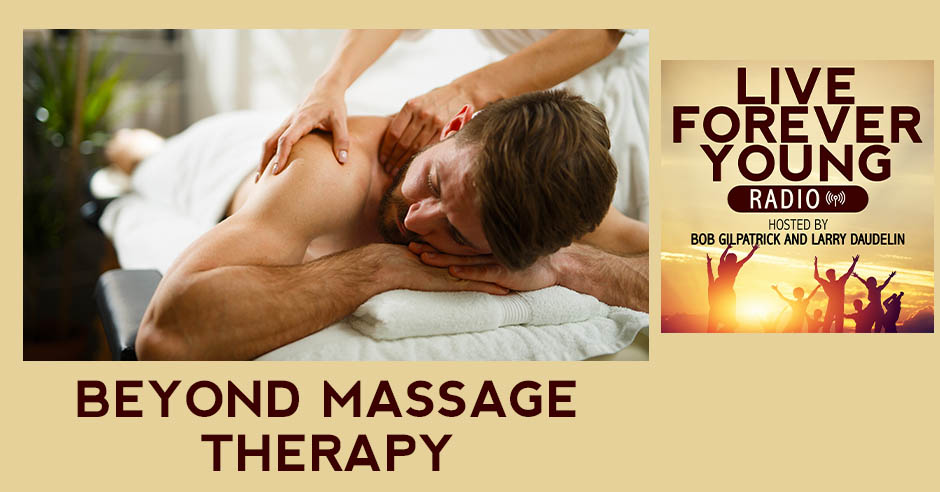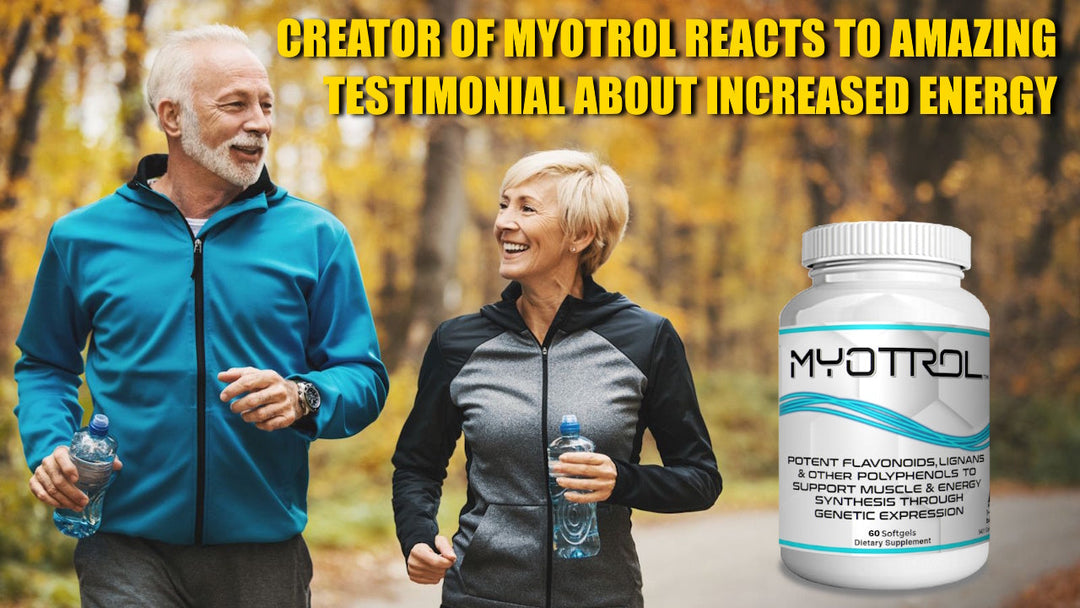Beyond Massage Therapy

Manual therapies don't just stop at massage; they go beyond with techniques like craniosacral therapy, somato-emotional release, and visceral manipulation. The craniosacral system is an important dynamic aspect of human health because it affects physical, mental, and spiritual aspects of health. The person skilled with somato-emotional release is a part psychotherapist and part manual therapist to allow that physical release and psychological improvement. Somato-emotional release allows us to free ourselves from trauma. Releasing something from you, trauma and weight, the body can let it go, but losing something too quickly without dealing with it, then the body will know that it is still there. From headache relief to aligning internal organs, you need these therapies to get you realigned physically and spiritually. Tune into today's show to learn what these lesser-known but amazingly effective manual therapies are and the amazing benefits they can have for your health.
---
Watch the podcast here
Beyond Massage Therapy
Manual Therapies Ep. 2
Manual therapies don't stop at massage. They go beyond with techniques like craniosacral therapy, somato emotional release, and visceral manipulation. Tune in to this show to learn what these lesser-known but amazingly effective manual therapies are and the amazing benefits they can have for your health. From headache relief to aligning internal organs, these therapies might be what you need to get you realigned physically and spiritually.
---
I'm here with Rollie Culp. How is it going?
Good.
Craniosacral therapy, somato emotional release, and visceral manipulation/how to work with the fascia, the endless web in your body, to release constrictions and things like that.
We are going to go over all these things. If you guys didn't read the other episodes, check them out. They will be up on BoomerBoost.com. You can go check them out. If you go to Live Forever Young Radio Podcass button, you will see about 70 or so different ones. The newest ones should be up. Thank you for reading and for being here. Let's start it out.
Craniosacral therapy is the first one we are going to talk about. It is something I didn't know anything about before I first started working here. The way I started learning a lot about it is people would call on the phone, and we would talk to them. They would take our products, and they still wouldn't be able to sleep, or they still wouldn't feel good, especially when you talk about sleep, not being able to sleep, and having issues with that. That is disruptive.
A lot of people don't realize that things that have happened in their past are still present in their subconscious, and they never dealt with it. It ends up causing a lot of stress and anxiety throughout their life. They never deal with it so they can't sleep, and they have other health problems. How do we deal with that? How does craniosacral therapy help with that thing?
Craniosacral therapy was created back in the early 1980s by Dr. John Upledger. He was a perceptive osteopath, a physician who participated in surgeries, including spinal surgeries. One day, his task was to hold the spinal cord still while an operation was being performed. He discovered that he couldn't hold it 100% because it seemed to be pulsing.
He began an investigation of this at his research institute and, over time, an advanced state of the art in medical knowledge about how the cerebral spinal fluid in the whole system of your brain, the surrounding tissues, dura mater, the fluid, how fills ventricles in the brain, how it releases, and all the way down the spinal cord.
Also, how the cranial sacral system with a sacral, meaning your sacrum, which is the bottom part of your spine, impacts your overall health, either in a negative way if you have restrictions or other issues or in a positive way if it is functioning smoothly and effectively. Therefore, it gives all the benefits to your whole body, mind, and spirit that this intense, energetic, cerebral spinal system has to offer. It is an important dynamic aspect of human health that affects every aspect of health, from the raw physical all the way to the spiritual.
John Upledger figured out this thing about the craniosacral system and the pulsing of it by having to try to hold one still. Was this during surgery?
Yes.
Imagine having to hold someone's spine still during surgery.
No mistakes are made. It was during those times when he discovered this pulse. If you are a trained craniosacral therapist, you can put your hands on the side of a person's head. You can feel it expanding and contracting. Your cerebral spinal fluid is filling in parts of your brain and expanding, and it contracts. Every seven seconds, your skull is going open and close. It is almost imperceptible, but the trained therapist can tell when this is occurring.
They also beneficially can apply energetic pressure to that pulse. When the pulse is on its way in, the therapist will use their intention to follow that pulse in. There is electromagnetic energy coming off everyone's hands, including the therapist. Over a short period of time, following this pulse in, letting it come out, following in, and attempting to hold it in creates this technique called Still Point, where the pulse stops. Still Point is a desirable state because they say, “Still Point is when your inner physician kicks in. You are in a place where your body can heal itself with the help and direction of the therapist.”
What you are saying is that the pulsing of the spinal fluid and the spine also relates to the brain. That is the same pulse. These therapists can manipulate the pulse, but what does that help with in the long run?
It kicks in your inner physician. It helps with all different kinds of things. This is one aspect of craniosacral therapy. There is Still Point in technique. It helps people with migraine headaches, pain in different parts of the back, issues related to your eyes, your immune system, and many different things.
One of the things you mentioned is the immune system thing. We have had some people we have spoken to over the years. They have had autoimmune disorders, things that have started out of nowhere. From what they tell us is like, “I started getting rheumatoid arthritis for no reason.” When they say no reason, it is not always for no reason. A lot of the time, there is something like a traumatic event that happened in the past, and the immune system is still reeling from that. That can add to more issues with your health, especially when you don't deal with that trauma.
One of the things we always talk about is craniosacral therapy can help go back and deal with that trauma. Even though it has passed already, you can bring it back up and help to tell your body, “Calm down.” One of the things I found interesting about craniosacral therapy is people don't even think about traumas that can affect their health like that.
[bctt tweet="Craniosacral therapy can help you deal with trauma. Even though it's passed already, you can bring it back up and help to tell your body to listen and calm down." via="no"]
Traumas can begin right at birth. When a child is born, depending on how they come out of the womb and the position of their body and head when they are being born, it can be traumatic. One of the techniques the skilled pediatric craniosacral therapist will do is when a newborn baby, maybe after a week or two, is brought to the therapist. They will hold the child and see what shape the different bones are in the skull. The skull bones are held together by sutures and stitches. When a child is first born, those bones move quite a bit. You have that soft spot on the top of your head.
If a child comes out in the birth canal, their head is in this position up, and it is forced that way. Because the bones are malleable, it can push the bones together in a way that creates constrictions. If the child's occipital bone is jammed against the temporal bones that have connected to on the side, it can affect blood flow to the brain and nerve flow via the vagus nerve, which starts in the brain and comes out through the back of your skull through these portals called the jugular foramen. The arteries come out there, and the vagus nerve. The vagus nerve innervates vast parts of your body, including your stomach and intestines. It works as a conduit of communication between organ systems and your brain.
This trauma can happen as they come out of the birth canal.
Their head is pressed in this position. It will compress the jugular foramen. Dr. Upledger has these beautiful videos where he shows how to do craniosacral for a newborn child. It has special certifications for people who want to go through that training so they can work on little babies. It is helpful for babies. Things like colic and other issues that tend to affect newborns can be mitigated by a cranial psychotherapist.
I didn't know anything about the baby part of it. I know the thing we talk about, especially with the immune system. That is something we have dealt with a lot. People don't realize it. This is the third part of a series we are doing on manual therapies. We are talking about massages and their benefits of it for your health. These are the one-off ones that not a lot of people know about. They fall under the manual therapies we are going over. If you guys have any questions and you want to ask something about craniosacral therapy, what it helps with, or anything like that, we are here.
What we were finishing up with was how cranial sacral therapy is used to help with releasing emotional issues we never dealt with and how that can help your health because sometimes those things can cause health issues like autoimmune disorders. That is where we are at. The next manual therapy we were going to go into is called somato emotional release.
This is less of a manipulation. It is part of craniosacral therapy. Dr. Ledger discovered as he was doing craniosacral therapy and teaching students that quite often, the issues they were trying to help the patient with had a deep emotional component to it. There have been a lot of books written about this most famous one by Dr. Bruce Lipton. He wrote the book The Biology of Belief. He documented how people's belief structures and emotional issues have a profound effect on the cells and the functioning of all of the 70 trillion human cells.
Somato emotional release was developed as a technique to go along with craniosacral therapy to help people release the constrictions in their bodies that were caused by physical or emotional trauma. Human beings tend to experience events in their life, sometimes sentinel events that are powerful and life-changing, like a serious car accident, a death in the family, and witnessing something horrific.
[caption id="attachment_2518" align="aligncenter" width="600"] Manual Therapies: Cranial sacral therapy helps people release the constrictions in their body caused by physical or emotional trauma.[/caption]
Manual Therapies: Cranial sacral therapy helps people release the constrictions in their body caused by physical or emotional trauma.[/caption]
The energy of that stress tends to lodge in places in your body, such as your leg muscles and heart muscles. There is this vibrational energy cyst that is constricting and making things difficult. The somato emotional release is a release where the therapist has the skill and training to facilitate a release of these energy cysts, thereby rendering the patient better capable of their body being aligned, emotions being modulated, and spiritual expression and reception being enhanced. Sometimes without the help of someone to help with these emotional releases, a person can go through their whole life with certain behavior patterns and emotional upsets that will linger on and affect them right up until the day they die.
That is what I was talking about with the people who can't sleep, people who have issues like that or anxiety disorders they didn't have before that started occurring after a sentinel event. That is the word I was looking for. If you have a sentinel event, your body reacts to it even in ways you don't understand. You think you have dealt with it here, but you haven't. That subconscious is not letting that go.
That is a therapy that goes well with other types of therapy. It is designed to help with emotional issues. The worlds of therapy would be manual massage-type therapy and psychotherapy. Upledger realized that the two of them went together. There were certain techniques and interventions that would involve the touch of someone's body with intention and skill that would help both a physical release and psychological improvement. We wanted to have a technique that merged those two worlds together. The person skilled in somato emotional release is part a psychotherapist and part a manual therapist.
It is a twofold thing.
It tends to be when the therapist has their hand over a spot where these energy cysts are, which a therapist can detect with their hands by running their hands hovering above the person's body. They can feel this energy. They say, “What is going on right here with your leg? Tell me how you feel when I put my hand over your leg. What does that bring up for you?”
Sometimes it is blatantly obvious. I have had this therapy done for me on my leg. For me, it was obvious. I broke my leg when I was in a car accident. On three different occasions, I was put under surgery with the stipulation that, “One of the possible things that might have to happen is we might have to amputate your leg. We are not sure if we can save it or not.”
There was a lot of emotional trauma around that. When I had this somato emotional release therapy done, I relived those experiences of the trauma of a potential amputation and was able to release it with the help of the therapist to let it go. My whole body, mind, and spirit became free of that intense, traumatic trauma of having both of my bones in my lower leg snapped in half were commuted compound fractures.
You told me that was a car accident you suffered when you were hit by a car.
It was when I was seventeen. Many years later, this amount of emotional release I went through was done when I was about 45 years old. Many years later, I experienced somato emotional release from that trauma. People may not have a trauma that serious, or it could be even worse. We have had to help people that had much worse traumas than that, where deaths occurred, including people's children that were accidentally killed by their own parents. That is about as traumatic as it gets.
With somato emotional release and the help of things like the emotional freedom technique, havening and inner balance, and the healing codes, you can provide a great service to a person who has had that extreme life experience. Not only are they unable to live a happy life, but they are physically dying because of the experience.
[bctt tweet="With somato-emotional release and the help of other techniques, you can provide a great service to a person with extreme life experience." via="no"]
The release of something is important. We talked about this concept when you release weight. If you release something, whether it is weight or trauma, your body can let it go. When you lose something quickly or you try to forget something, but you don't deal with it, the body knows it is still there. You will have these somato emotional issues that you might need to release. That is what we are talking about. One of the things that craniosacral therapy can do is take those sentinel events and experiences your body can't forget about and help you have to relive it. You have to go back through it, but that is when you deal with it.
What we were saying is this is a gentle process. It is not a hard process. You talk about these other therapies that Bob mentioned, the tapping, which is called the emotional freedom technique, head circles, and havening touch. This is all stuff you can learn about on our show. If you go to BoomerBoost.com, we have episodes on all those things. You can search for emotional freedom technique, head circles, and havening. You will be able to find all the episodes we did prior. Check that out.
For anybody who is out there reading, the reason why I keep turning this way is that we are not only recording, but we are having a live TikTok session right here. If you want to join in on TikTok, we will usually be doing it throughout the week at 11:00 AM. I will send out live events. You guys can come, join in, and take part in the discussion. Thank you for reading. The next thing that we were going over was visceral manipulation. It is a little bit different than all these. This is the one where the touch is a little bit harder.
There are different schools of training for people to deal with the fascia. Visceral manipulation technically refers to the internal organs. Organs in your torso, lungs, heart, liver, kidneys, and intestines are all situated inside your cavities in a way they can move when your body moves. When you are twisting, turning, and doing sit-ups, those organs have to be able to glide around each other and across each other so they are not bumping against each other.
With all the things that are in your center cavity here, there would be a lot of dancing of organs, so they don't get bumped into or tangled with each other.
There is a web of tissue that holds all those organs in place and allows them to glide in the right way. That is what is called fascia. They call it the endless web. It is throughout your body. It is holding other things together in addition to your internal organs. This fascia is like spiderweb-type material. It can get constrictions in it. It also can get torn slightly and move in the wrong direction. Because it is an endless web, you can have fascia that has been stretched or contorted in one part of your body that is affecting the part next to it. You can have this cascading effect where you can have pain somewhere in your body that's being caused by a constriction somewhere else.
A little review here for everybody who is reading. The fascia is what they call the endless web of your body. In your body, you have organs. The organs have to slide and move around as you're twisting, turning, being energetic, doing sit-ups, or whatever you are doing. They have to be able to slide without interfering with each other. What we are talking about here is the fascia, which is like a bag or a web that holds your organs in place. Sometimes this fascia can get affected by different things, injuries, and things like that. We are going over different techniques to help soothe and release the fascia.
Usually, there is a symptom that is a precipitating factor. If someone is having trouble with digestion or kidney function, the therapist will palpate and detect where things are out of place a little bit. Someone's colon might be prolapsed to a certain extent. The therapist can rearrange things by gently touching and, sometimes, more than gently manipulating that fascia where there might be constrictions.
They can break it down and release any constriction pulling on something or not allowing an organ to glide properly. They can realign things so the patient will have a positive outcome. There are different schools that people go to to learn such things. Some of them are more physical types of interventions and some are more energetic.
[caption id="attachment_2519" align="aligncenter" width="600"] Manual Therapies: The therapist can rearrange things by gently touching and sometimes, they can break them down and release any constriction.[/caption]
Manual Therapies: The therapist can rearrange things by gently touching and sometimes, they can break them down and release any constriction.[/caption]
When you say energetic, are you talking like Reiki? Reiki healing is something we didn't have on the docket, but it is energetic healing. We have a woman who works with us named Lucy. She helps on the phones. She is a great therapist. She has a good handle on Reiki energy. She is technically a Reiki master. She can use energies to help with different diagnoses as far as what part of the body is hurting. She is good with that. It is a real thing. A lot of the stuff we are talking about sounds woo-woo, but there is actual science that backs this stuff up. That is why we are going over it because a lot of people don't know about it and wouldn't give it a chance if they had no clue.
It used to be considered more woo-woo, but when you have many thousands of medical doctors who are trained in these techniques, and physical therapists who are classically trained are learning these techniques, it has become a lot more mainstream when you have tens of thousands of medical doctors in the United States and around the world that have been trained in these techniques. They realize the value of it.
I will give you an example of a couple of the different techniques for manipulating fascia. One is called Rolfing. Ida Rolf was the Founder of this technique. Rolfing is done in a series, but it doesn't have to be. People will sign up for a series of ten-hour-long sessions. The therapist will work on different parts of their bodies. For example, their lungs.
They will palpate the tissue in the chest and find places where there are restrictions with physical force. Sometimes fingers, knuckles, and elbows will break down this fascia and realign it in the way that it needs to be realigned. As a result, it allows someone to breathe more freely. They will do it all throughout the person's body. That is why they have ten different sessions. They go in a sequence.
Is Rolfing one of the ones that can get a little more physical?
It doesn't have to be. The main complaint people have about Rolfing is it is painful. It also creates somato emotional release. There are lots of people having emotional events where they are crying. Communicating with the Rolfer or therapist tends to do that.
Somato emotional release, we were talking about that with craniosacral therapy. By using these other techniques, a somato emotional event can happen because you are manipulating these parts, which can cause an emotional release. It's a physical release that ends up being an emotional outlet.
If you are a consumer or someone thinking about going for manual therapies, any of these manual therapies can stimulate an emotional release. If you are a person who has had serious trauma in their life from your childhood, maybe abused in your childhood, or you have been in a war, if you are going to go for therapy, you are better off going to get therapy from someone who is trained in somato emotional release because even the most casual massage, you can have these emotional releases.
If the person who is the therapist is not skilled in helping people as a facilitator to help them through it, you can end up with some negative outcomes that can be severe. If you are a person who has been traumatized, and you are going to go for a massage, do your homework and find a massage therapist that is trained and certified in somato emotional release.
[caption id="attachment_2520" align="aligncenter" width="600"] Manual Therapies: If you're traumatized, go for a massage, do your homework, and find a therapist trained and certified in somato-emotional release.[/caption]
Manual Therapies: If you're traumatized, go for a massage, do your homework, and find a therapist trained and certified in somato-emotional release.[/caption]
You were telling me a story. I don't know if it was someone we knew or someone you knew. They went and got a massage. The massage ended up releasing the somato emotional huge release, apparently. Unfortunately, the massage therapist helping him wasn't trained in it and didn't know how to handle this. It made it worse for a while until he went and saw someone trained in craniosacral therapy with somato emotional release.
Let’s say you are getting ready to relax. You think you are going to have this nice massage. Something gets hit in your body physically, and your mind starts going crazy. That is not relaxing at all. You want to do your homework and make sure if you know that you are someone who has a lot of historical trauma in your life, you are going to want to make sure you see somebody who can help control that if it gets let out of Pandora's box.
It is easy to do because you have the Upledger website. Dr. Upledger has since passed away.
It is Upledger.com.
You can go and search for therapists who are trained in somato emotional release. Go to Find A Therapist, go to Advanced, click the button, and click SomatoEmotional Release. Put in your ZIP code. There will be a list of people in your ZIP code. If it is not there, you can change the ZIP code to a nearby or a bigger city. Sometimes people will have to search for a city where they are going to visit a relative or go on vacation. The Upledger Institute is in Southeast Florida in the Miami area. People that go on vacation there will sometimes book sessions at that institute.
You mentioned a book we were talking about during the conversation, The Biology of Belief. Who was the author of that?
Bruce Lipton.
One of the things we didn't talk enough about is the belief of something, how your belief can affect you more than specifically physically and mentally, but you don't realize that what you believe is what makes you. If you believe you can't get over something, it is going to be 100 times hard.
Humans create beliefs about things, events, societal norms, themself, and their families. We have these filtering systems where we tend to say, “This is a hard-held belief that I have.” Whenever evidence is coming to you, people will tend to delete things, distort things, or generalize things in their brain filters to make it match the belief they already have, whether it is contrary to that belief or not. Eventually, your beliefs affect your personality.
Your personalities are a collection of your beliefs, how you discuss things, and where your biases are. This can cause a problem because if people end up with limiting beliefs such as, “I'm never going to get better because,” or, “I'm never going to have enough money because,” they get reinforced by this filtering mechanism and, in some cases, will create trauma inside your body. If you have this hardcore belief that you are not good enough and you are never going to succeed, that is going to make you sick.
These are some of the issues that come up during somato emotional release and in other types of therapies and psychotherapies. A lot of this is what you are getting at. I wanted to mention in regard to the visceral manipulation/working with the fascia. There are a couple of other places. One is called Aston Therapy. Judith Aston was a colleague of Ida Rolf. She developed a technique called Aston Therapeutics. It is a combination of Rolfing and energetic healing like Reiki.
It is extremely effective. The people who come for this therapy are the ones whose bodies are out of alignment. They got some scoliosis, one shoulder is going down lower than the other, or their back is hunched over. The trained therapist, who is trained with Judith Aston, has the ability to see where these misalignments are. They draw it on a diagram. They will proceed with massage therapy, energetic therapy, and manipulation of the fascia to help realign the person's body. When it gets realigned, it tends to realign their life. When your body is twisted, contorted, and painful, your life can be painful. As you release, you tend to have better emotional flexibility and spiritual acumen.
Another great technique, which was similar to Aston Therapeutics, was created right here in the St. Petersburg area. It is a neuromuscular therapy technique. The center is called St. John - Clark Pain Center. People come from all over the world to visit. Typically, people who are in such severe pain that hasn't been helped anywhere else will find their way from foreign countries or even right nearby to that clinic. They also have trained many therapists and opened numerous clinics around the country and in different countries. Like with the Upledger Institute, you can go to St. John - Clark Pain Center and find a therapist.
You can't find them on Upledger, but it is called St. John - Clark Pain Center. Do a Google search, and you will be able to find that. You are saying that it helps people who have had chronic pain that hasn't been able to get helped anywhere else.
Paul St. John is a skilled therapist. He developed this therapy for himself because he was in the Vietnam War. He was in a helicopter accident and severely injured his spine. For years, he was in extreme pain, and nobody was able to help him. He started doing an intense study on all different types of therapy for pain. He came up with an idea that he felt would help him. He commissioned other therapists. He taught them what he wanted them to do. That therapy for his back pain worked. It gave rise to the center.
He taught everybody his technique. He had them use it on him to make sure it worked, and it worked.
It has been many years where he has trained a lot of skilled therapists that have benefited a lot of people. Many thousands of people have been able to get out of the pain that was ruining their life with the assistance of people like Paul St. John, his therapists, and people that have been trained in Rolfing, Aston Therapeutics, and visceral manipulation at Jean-Pierre Barral’s school, which you can find on the Upledger Institute site.
Is the Aston Therapy on Upledger? Can you not find that there?
It used to be, but it is easy to find.
A review, craniosacral therapy is the first thing we went over. We talked about how that related to somato emotional release. Craniosacral therapy is a therapy that uses a light touch. It helps to nourish the nervous system. The thing that cranial sacral therapy can help with self-healing and physical things like headaches. It is also beneficial for newborns. We talked about how newborns can have issues right from the beginning, especially during birth. They have soft heads. They can get a little squished up. Sometimes craniosacral therapy can help with that.
Another part of craniosacral therapy was somato emotional release. It expands on the craniosacral therapy idea. That helps get rid of the negative effects of maybe traumatic experiences, sentinel events, and some injuries. Injuries are traumatic. People heal from injuries, but a lot of the time, they don't deal with the mental trauma that comes along with it. Bob broke his leg when he was seventeen years old and almost got it amputated, but he didn't deal with that whole fear of having his leg cut off until many years later.
[bctt tweet="People heal from injuries but don't deal with the mental trauma that comes with them." via="no"]
If there is something that is bothering you that you are never able to take care of, this is a way for you to bring that back up, live through it, and move forward from it. If you can't move forward from it and you are trying to be healthy, your body believes it can't get over something. It is the biology of belief. You have a hard time, and your body responds negatively because your mental aspects and your beliefs are negative.
Visceral manipulation is what we went over, the different parts of it, and how your fascia holds your organs together. Fascia is like an endless web. It can get traumas, and they need to be released. When you release the restrictions in your fascia, it can help the alignment of your entire body, muscles, tendons, bones, and internal organs. When you align that, your life starts to realign. If your body is in alignment, your life starts to follow.
A couple of the therapies we were finishing out with was Rolfing, a physical manipulation of the fascia. It can be a little painful sometimes. There is another one that uses Rolfing and energetic healing called Aston Therapy. It took a little bit of the Rolfing idea and combined it a little bit more with Reiki. We were talking about Reiki, which is energy healing.
Neuromuscular therapy was one of the newer ones that were founded right around our neighborhood, St. John- Clark Center. That helps with similar things as visceral manipulation, Rolfing, and Aston Therapy, but it takes a little bit different approach to it. That was good. I remembered all that. I listen and retain. I have to put it into practice.
Rollie, sometime in the future, we should do something about chiropractic.
We didn't have chiropractics scheduled for the series, but maybe on our next one, we should do about chiropractic. Christie, who is in here, had an issue. One of the things she said was beneficial was the chiropractor. I don't think she went to one before. It lets you think, “I don't know if it will help.” You then go, and it makes a difference. Let's do some chiropractic.
We are about to wrap up. I want to say thanks to everybody who is reading. If you want to be somebody who can join in on the discussion, go ahead and follow @BobGilpatrick on TikTok, or you can follow me, @RollieCulp, on TikTok. We do our lives. We will be doing them at 11:00 AM. We will also be taking time to answer any questions. If you guys have anything you want to share or go over, we will be more than happy to do that. We are not doctors. He is a certified holistic nutritionist. I was talking to Bob about it. I'm going to be getting certified here real soon. We look forward to talking to you in the future. Thanks.
Thanks for reading. We will see you in the next episode.
Important Links
- BoomerBoost.com
- The Biology of Belief
- TikTok – Boomer Products
- Upledger.com
- St. John - Clark Pain Center
- @RobertGilpatrick - TikTok
- @RollieCulp - TikTok






Leave a comment